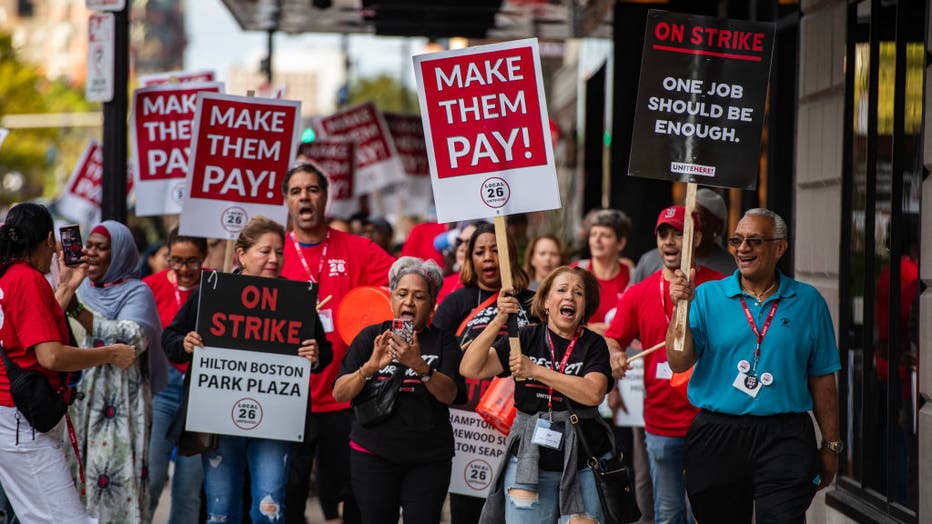Hotel workers strike across major US cities. What it means for guests
Hotel workers in Seattle join nationwide strikes
Workers at several hotels in the Seattle area joined thousands of other hospitality staff striking across the country. (Credit: UNITE HERE Local 8 via Storyful)
Some 10,000 hotel workers represented by the UNITE HERE union walked off the job Sunday at 24 hotels in eight cities, including Honolulu, Boston, San Francisco, San Jose, San Diego and Seattle.
There could be even more strikes as contract talks stall over demands for higher wages and a reversal of service and staffing cuts.
A total of 15,000 workers have voted to authorize strikes.
Unionized housekeepers are continuing to engage in a fierce fight to restore automatic daily room cleaning at major hotel chains, saying they have been saddled with unmanageable workloads, or in many cases, fewer hours and a decline in income.
RELATED: Nearly 30% of young travelers dismiss relaxation-focused vacations: study
The dispute has become emblematic of the frustration over working conditions among hotel workers, who were put out of their jobs for months during pandemic shutdowns and returned to an industry grappling with chronic staffing shortages and evolving travel trends.
Michael D’Angelo, Hyatt’s head of labor relations for the Americas, said the company's hotels have contingency plans to minimize the impact of the strikes. "We are disappointed that UNITE HERE has chosen to strike while Hyatt remains willing to negotiate," he said.

US hotel workers demonstrate as they strike over the Labor Day holiday weekend outside of the Boston Park Plaza Hotel in Boston, Massachusetts, on September 2, 2024.(Photo by Joseph Prezioso / AFP) (Photo by JOSEPH PREZIOSO/AFP via Getty Images)
In a statement before the strikes began, Hilton said it was "committed to negotiating in good faith to reach fair and reasonable agreements." Marriott and Omni did not return requests for comments.
The labor unrest serves as a reminder of the pandemic's lingering toll on low-wage women, especially Black and Hispanic women who are overrepresented in front-facing service jobs. Although women have largely returned to the workforce since bearing the brunt of pandemic-era furloughs — or dropping out to take on caregiving responsibilities — that recovery has masked a gap in employment rates between women with college degrees and those without.
RELATED: Alaska Airlines flight makes sudden diversion after pilot says he's not certified to land: report
The U.S. hotel industry employs about 1.9 million people, some 196,000 fewer workers than in February 2019, according to Bureau of Labor Statistics. Nearly 90% of building housekeepers are women, according to federal statistics.
Hawaii hotel workers join nationwide strike
Around ten thousand hotel workers across the US began a multi-day strike on Sunday, September 1, after months of unsettled negotiations. (Credit: @alohadajosh via Storyful)
It's a workforce that relies overwhelmingly on women of color, many of them immigrants, and which skews older, according to UNITE HERE.
Union President Gwen Mills characterizes the contract negotiations as part of long-standing battle to secure family-sustaining compensation for service workers on par with more traditionally male-dominated industries.
The union hopes to build on its recent success in southern California, where after repeated strikes it won significant wage hikes, increased employer contributions to pensions, and fair workload guarantees in a new contract with 34 hotels. Under the contract, housekeepers at most hotels will earn $35 an hour by July 2027.
RELATED: Breaks in main water pipeline for Grand Canyon prompt shutdown of overnight hotel stays
The American Hotel And Lodging Association says 80% of its member hotels report staffing shortages, and 50% cite housekeeping as their most critical hiring need.
Since the pandemic, UNITE HERE has won back automatic daily room cleans at some hotels in Honolulu and other cities, either through contract negotiations, grievance filings or local government ordinances.
The U.S. hotel industry has rebounded from the pandemic despite average occupancy rates that remain shy of 2019 levels, largely due to higher room rates and record guest spending per room. Average revenue per available room, a key metric, is expected to reach a record high of $101.84 in 2024, according the hotel association.

